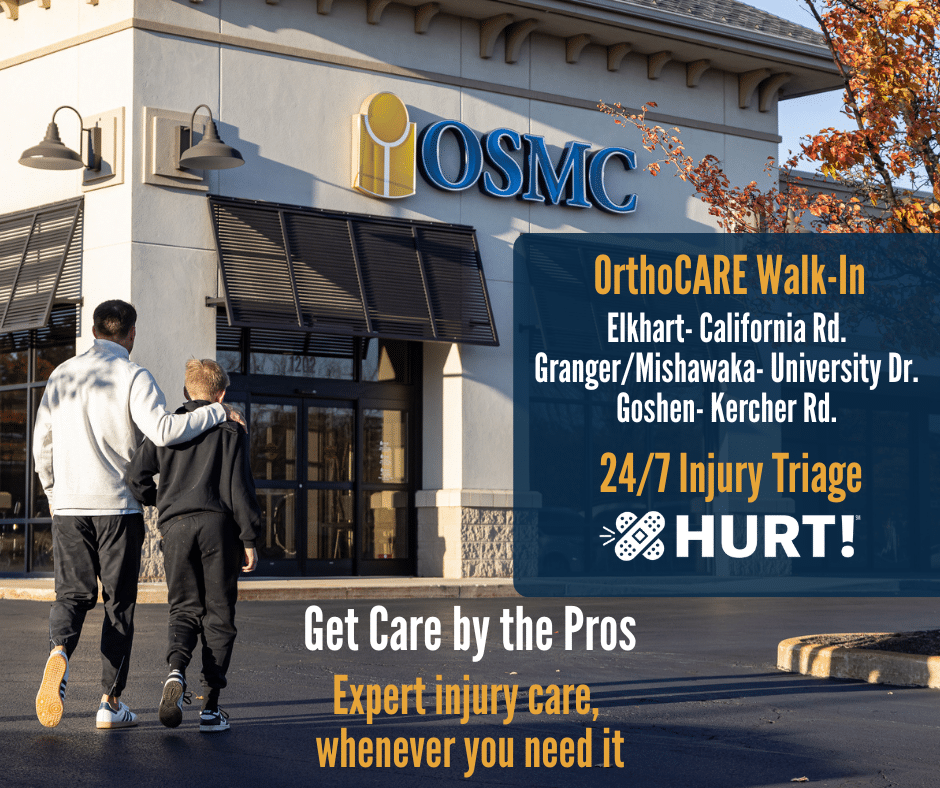Shoulder Pain Specialist in Michiana, Northern Indiana, and Southwest Michigan Area
Shoulder Pain Treatment With OSMC
Struggling with shoulder pain? Wondering "What is causing my shoulder pain?" or "Is my shoulder pain serious?" You're not alone. Our Orthopedic & Sports Medicine Center (OSMC), with convenient locations in Elkhart, Goshen, Granger, Middlebury, and Nappanee, IN, is here to provide answers and advanced treatments.
Shoulder pain is a common issue that can arise from various causes, impacting your ability to move freely and enjoy life. Whether you're experiencing discomfort only when moving your shoulder or suffering from persistent pain, it's crucial to understand the underlying causes and seek professional medical diagnosis and treatment.
Why Does My Shoulder Hurt?
Your shoulder is involved in nearly every arm movement, making it susceptible to injury and overuse. This joint's complexity and constant use can lead to instability, pressure on soft tissues or bones, and pain. Activities ranging from sports like swimming, tennis, and weightlifting to everyday tasks can contribute to shoulder injuries. But what precisely might be causing your discomfort?
What’s Causing My Shoulder Pain?
An accident, unhealed injury, posture, or other lifestyle factors could cause shoulder pain. Other causes include:
- Bursitis: Inflammation of the bursa sacs that cushion shoulder joints.
- Tendonitis: Inflammation or irritation of tendons.
- Shoulder Arthritis: Degeneration of the shoulder joint.
- Shoulder Impingement: When shoulder muscles are pinched during movements.
- Rotator Cuff Injuries: Strains or tears in the shoulder's rotator cuff
- Shoulder Fractures: Breaks in the shoulder bones.
These conditions often require medical attention to prevent further damage and alleviate pain. Your OSMC specialist will work with you to determine the cause of your shoulder pain and tailor a treatment to meet your needs.
How is Shoulder Pain Treated?
Initial treatments typically involve rehabilitation techniques, such as physical therapy, to restore function and relieve pain. If these measures prove insufficient, surgical options may be considered, including:
- Rotator Cuff Repair
- Total Shoulder Replacement
- Shoulder Arthroscopy
- Acromioclavicular Joint Repair
Our providers at OSMC are equipped to handle various shoulder issues, providing non-surgical and surgical solutions tailored to your needs.
What Can I Expect From Shoulder Surgery Recovery?
Recovery from shoulder surgery is a critical period that demands careful attention and adherence to prescribed protocols, including:
Post-Surgery Care: Initial rest with prescribed pain management and anti-inflammatories.
Wearing a Sling: To immobilize and support the shoulder during the initial healing phase.
Physical Therapy: Begins even while in a sling, focusing on gradually restoring strength and flexibility.
Gradual Resumption of Activities: Carefully increase the use of the arm without overloading the healing shoulder.
Full recovery can take 3 to 6 months, with a careful and monitored return to athletic activities or physically demanding work to prevent setbacks.
Relief from Shoulder Pain at OSMC
Don't let shoulder pain hold you back. Contact OSMC today at (574) 264-0791. With locations in Elkhart, Goshen, Granger, Middlebury, and Nappanee, IN, our team is ready to support you through diagnosis, treatment, and recovery, helping you return to a pain-free, active lifestyle.

Shoulder Pain and Injury Care Northern Indiana & South Central Michigan
The orthopedic specialists at OSMC are highly experienced in diagnosing and treating shoulder problems. Some conditions are effectively treated with physical therapy. For some patients, surgery, including shoulder joint replacement, may be the most appropriate treatment option.



